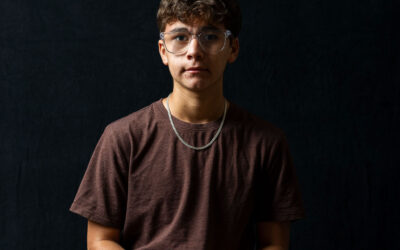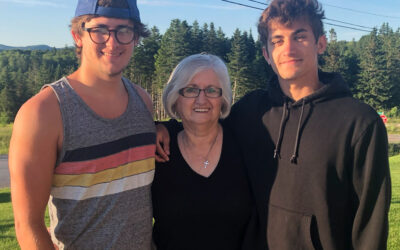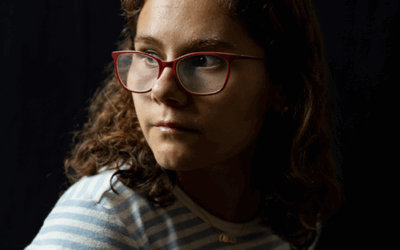blog
Motherhood, vision loss, and finding connection in unexpected places.
by Meagan Moore
September 4, 2025
An Unforeseen Path
There are mornings when simply getting out the door feels like an obstacle course with one child searching for a missing shoe, another in tears because someone looked at her the wrong way, and a third flatly refusing to brush his teeth. That kind of chaos is not unusual in my home. And layered beneath it all is this: I have Usher syndrome.
I was diagnosed at 24, had just married my high school sweetheart and was working full-time as a registered nurse. I felt as though I was finally settling into adulthood. Life felt full and manageable, until the day I received a diagnosis that would redefine everything. Usher syndrome meant that the hearing loss I had lived with since childhood would now be accompanied by progressive vision loss. Two sensory disabilities that, together, would fundamentally alter how I navigate the world.
I wasn’t angry, just overwhelmed. I grieved the loss of independence, the shift in identity, and the creeping fear of becoming a burden. For most of my life, I had downplayed my hearing loss, determined to blend in and carry on as though it didn’t matter. But losing my vision too? That was a turning point I never anticipated and one I could neither ignore nor pretend away.
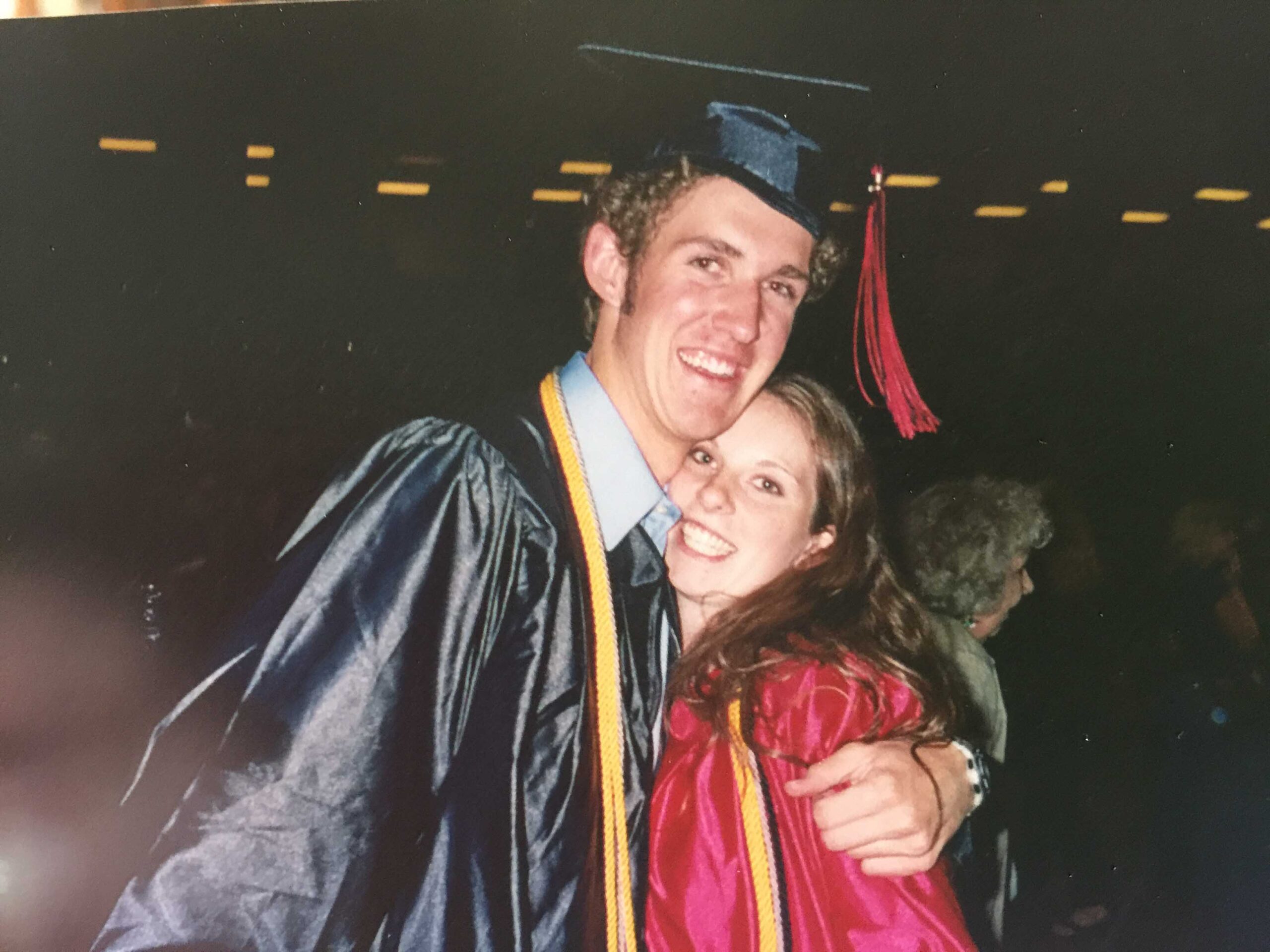
A young couple smiles and embraces at a graduation ceremony. Meagan, wearing a red graduation gown with honor cords, leans into Joel, who is dressed in a black cap and gown with a red tassel and gold cords. They appear joyful and proud. The background is dark, with a few other people faintly visible, suggesting an indoor event. This moment captures Meagan with the boy she loved in high school—Joel—whom she later married.
Embracing a New Reality
At the time, I had met a few peers with hearing loss, but I rarely experienced a true sense of connection. I had spent most of my life identifying with the hearing world, working hard to blend in. The onset of vision loss introduced an entirely unfamiliar reality, and I didn’t know anyone else navigating both. It was profoundly isolating and not just a fleeting sense of loneliness, but a persistent, quiet ache that made even ordinary routines feel heavy.
I have always wrestled with the idea that everything happens for a reason. Over time, I’ve come to believe that not everything needs a reason to matter. Some things are painful, unexpected, or unfair, but meaning can still emerge from them. Living day by day with Usher syndrome has fundamentally changed how I see the world. (And yes, I recognize the irony in that statement.)
I used to believe that fulfillment required checking all the boxes; owning the ideal home, taking dream vacations, and creating a picture-perfect life that looked good from the outside. I was chasing an image more than a reality. I worried that if my life didn’t look effortless and polished, it would somehow mean I had failed. But I’ve come to understand that real joy is rarely tidy. It’s found in the ordinary, quiet persistence of showing up for your life, even when it’s hard. Now, I’ve learned to be present and to take in what is, rather than waiting for what might be. Why wait to live fully?
As a child, I believed that having hearing loss meant I could never be a good mother. Now, as someone also losing their vision, I know that belief was wrong. I am a good mother. I have three vibrant, messy, magical children (a 12-year-old boy, a 9-year-old boy, and a 7-year-old girl) who fill our days with noise, laughter, and chaos. I married the boy I fell in love with in high school, and together we navigate this beautiful, complicated life one moment at a time.
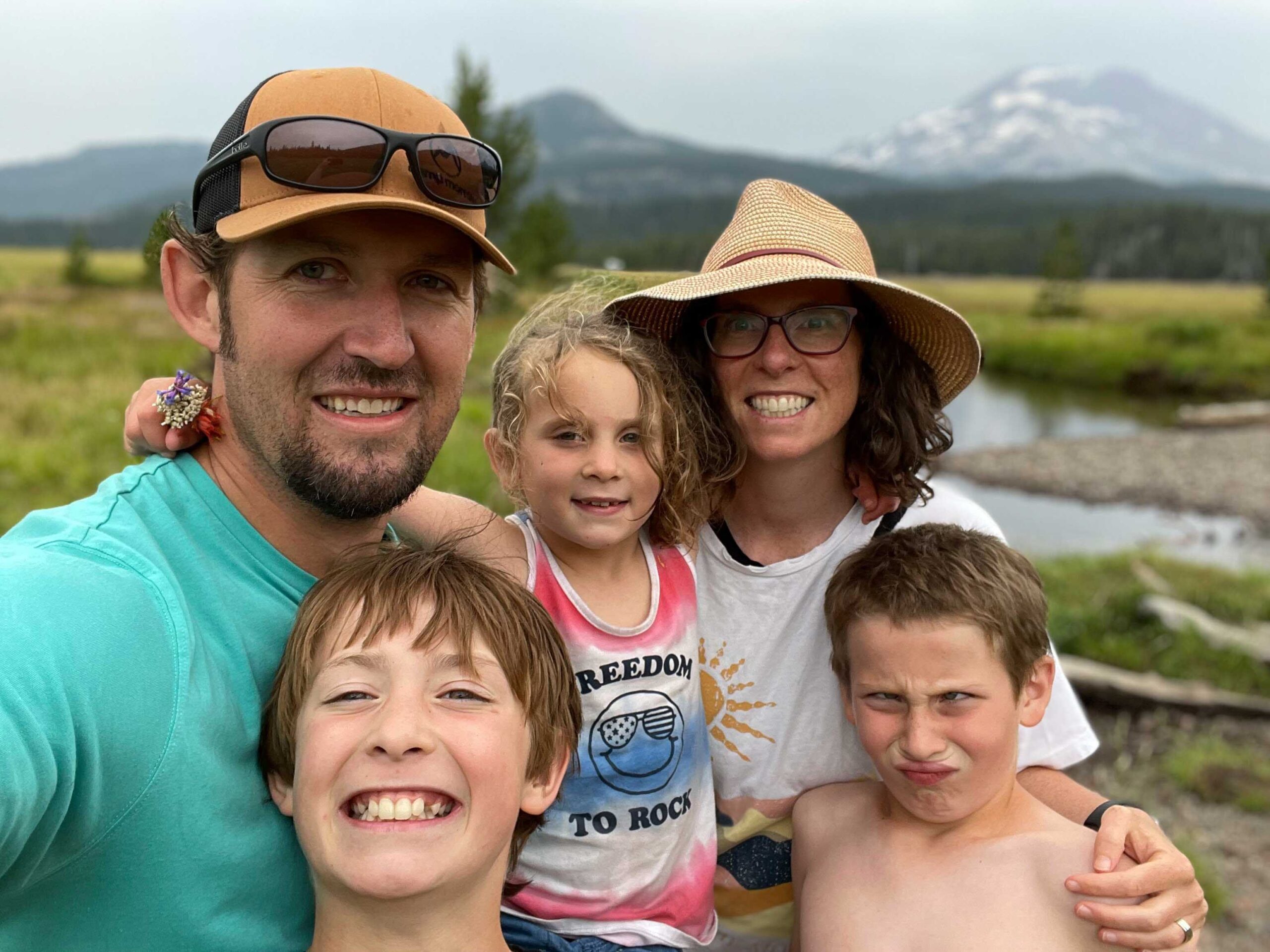
Meagan and Joel stand with their three kids in a grassy field with a stream and snow-dusted mountains in the background—a place they frequent and enjoy often. Meagan wears a straw hat and glasses, and Joel wears a brown cap and teal shirt. Their daughter, in a “Freedom to Rock” tank top, holds a small bouquet of wildflowers and smiles. In front, their two shirtless sons pose—one grinning, the other making a playful face. The overcast sky and scenic mountain setting frame this joyful family moment.
Forging Connections
Living with Usher syndrome can be profoundly isolating. So can motherhood. Together, they form a relentless test of emotional and mental endurance. Early on, I was fortunate to find a remarkable group of fellow mothers. We came from different walks of life; some homeschooled, others relied on public schools; some baked organic quinoa muffins, while others embraced the drive-thru. But none of that mattered. What united us was a shared commitment to lifting one another up. No judgment—just the raw, imperfect joy of motherhood.
Then we moved and I lost that community. I tried to build a new one, but despite repeated efforts, I struggled. Rejection is painful, especially when you are already learning to navigate a world that is increasingly difficult to see and hear. The pandemic forced me to face my vision loss. Driving became a source of dread marked by anxiety, cold sweats, and an endless loop of “what ifs.” What if I made a mistake? What if my children got hurt? Ultimately, I made the painful decision to stop driving. I grieved. And then I reached out.
I joined the Usher Syndrome Coalition, where I now also volunteer as the Ush Ambassador for Oregon to support others navigating similar journeys. I went to my first conference in Texas and made even more connections. At the conference I had my portrait taken for the Usher Syndrome Society’s Shine a Light on Usher Syndrome campaign, which was a very vulnerable moment for me. I don’t like photos taken of me, especially because they can reveal aspects of my disability that others don’t often see. I had mixed feelings about it because of that vulnerability, but I was also proud to be part of a community of people who understand the journey and could be part of a campaign that could find a cure.
I kept coming across support groups for parents of children with Usher syndrome, which is wonderful and much needed. But I couldn’t help wondering about the parents who have Usher syndrome and are raising children of our own? Eventually, I decided to take the leap and create a space specifically for us. I started a Facebook group. At first, it was just a handful of mothers I had connected with through social media and word of mouth. We began with four members. Today, we are more than 150 strong.
It’s a space where we can be real. We share our fears and hopes, our everyday challenges and small victories. Sometimes our conversations revolve around Usher syndrome; other times, they’re simply about life. We hold monthly virtual gatherings and have hosted two in-person retreats with more on the horizon. The gift of hearing someone say, “You don’t have to explain yourself here” is deeply comforting.
At one retreat, someone brought popcorn to share. As the bowl made its way around the room slowly and a bit awkwardly, each person had to be tapped and loudly called by name. No one was irritated. No one needed to explain. We simply passed the bowl, shared a laugh, and enjoyed the moment together. It wasn’t efficient, but it was full of grace.
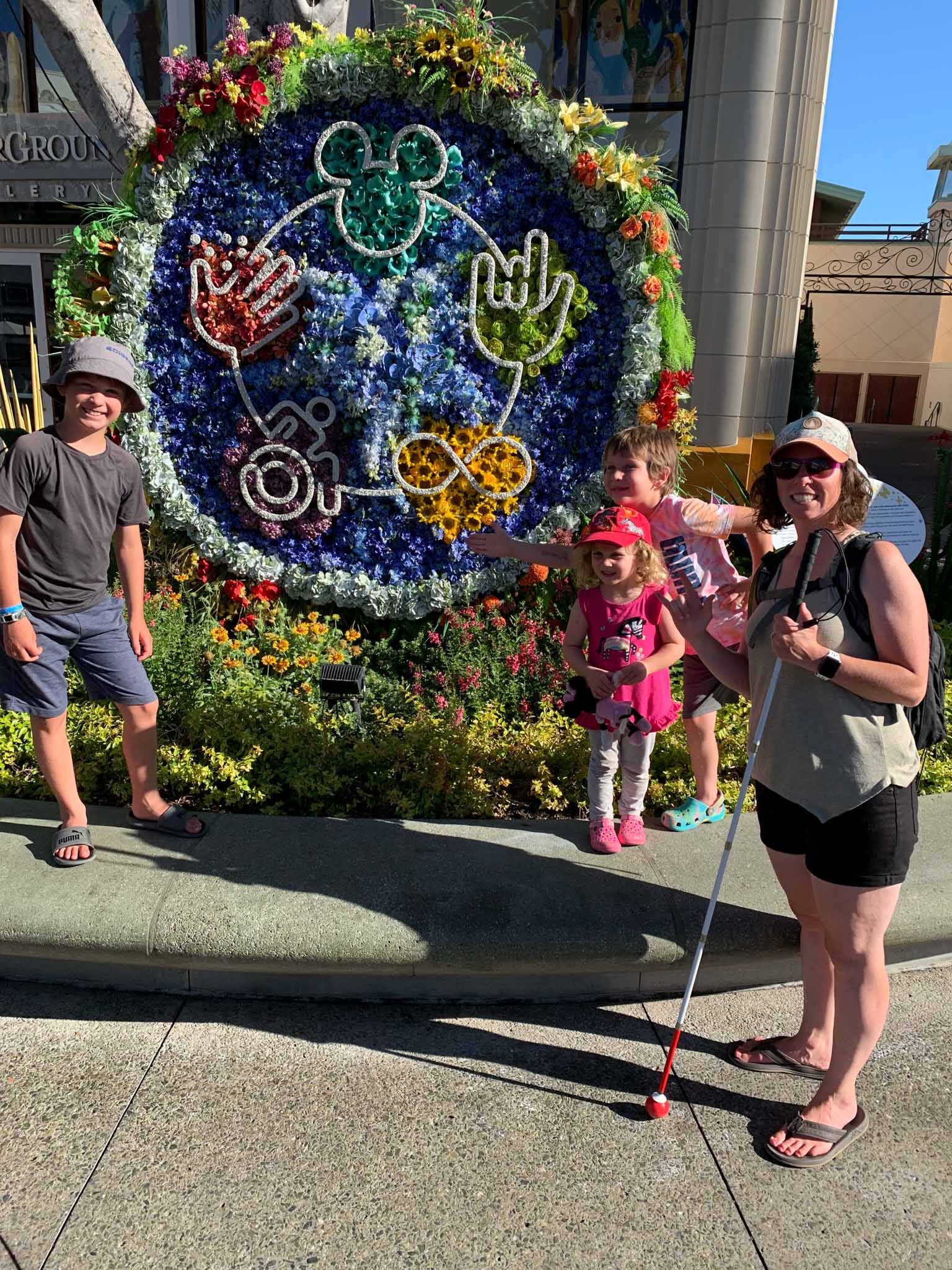
Meagan stands with her three kids in front of a large, colorful flower display at Disneyland. The circular floral arrangement features symbols of inclusion made from flowers, including a wheelchair, an infinity sign, ASL hand signs, and Mickey ears. Meagan, holding a white cane with a red tip in one hand, makes the “I love you” sign in American Sign Language with the other. She smiles brightly, wearing sunglasses and a hat. Her three kids, dressed casually and also smiling, pose beside her in the sunny, flower-filled setting.
Defining My Own Life
This isn’t the life I imagined, but it’s the one I’ve grown into with resilience, with honesty, and with an ever-deepening capacity to love. Living with Usher syndrome hasn’t been easy. Some days are heavy. Some moments ache. But I’ve stopped waiting for life to look a certain way in order to be worth living. I still miss things visually, audibly, emotionally. But I’ve also gained a fierce appreciation for the people who stay and for the quiet power of being understood. I’ve learned that community doesn’t have to be large to be life-giving. It just has to be real.
So no, Usher syndrome doesn’t define me. It shapes me, but it doesn’t limit me. I’m still here, growing and finding meaning in the mess, and connection in places I never expected. If I could offer anything to someone walking a similar path, it would be this: you don’t have to wait until everything feels manageable, or polished, or figured out. You are allowed to live fully as you are. Especially as you are.
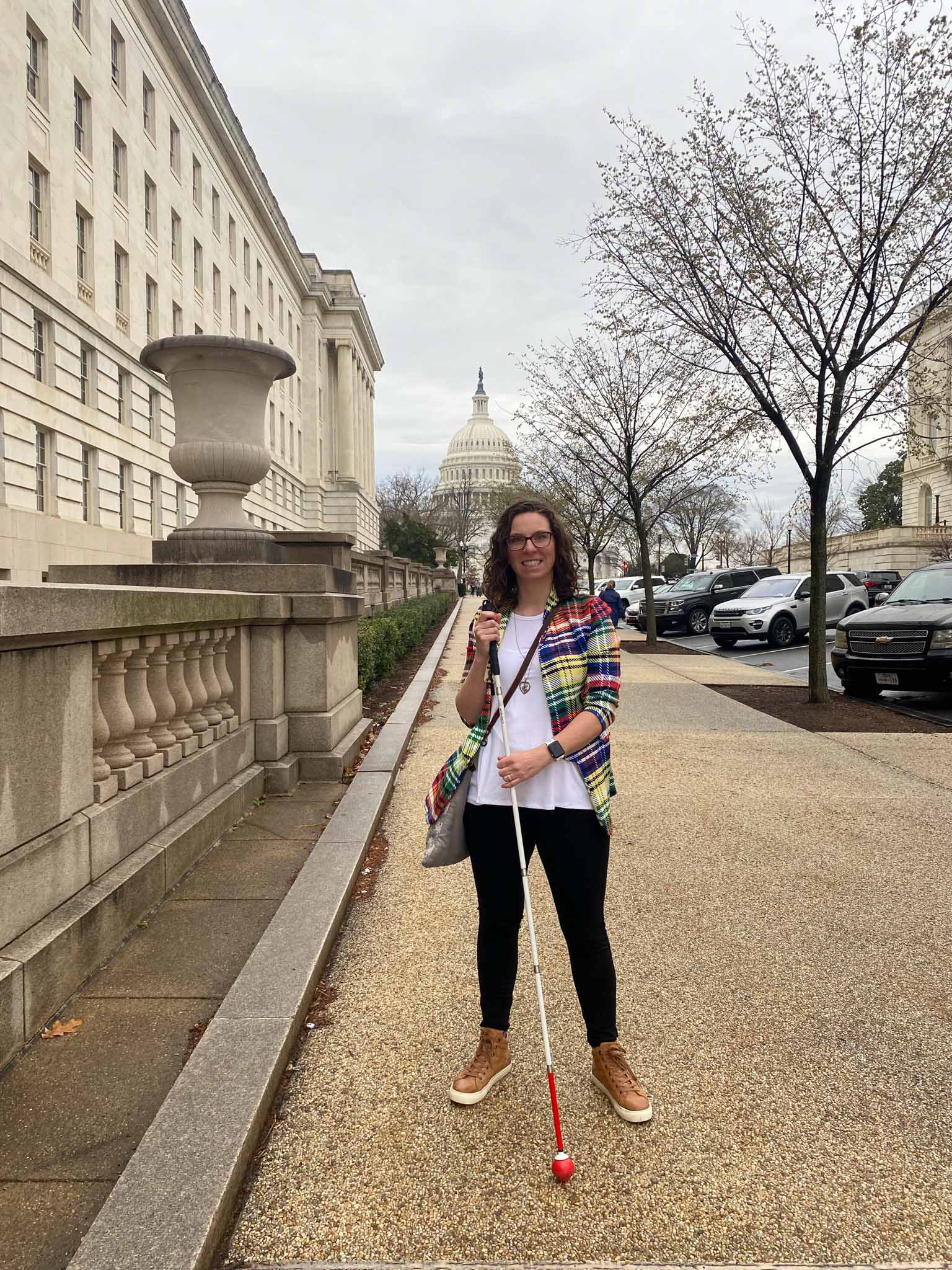
Meagan stands on a path near the U.S. Capitol during Rare Disease Week 2023, holding a white cane with a red tip and smiling. She wears a colorful plaid jacket, black pants, and boots. The Capitol dome rises in the background under a cloudy sky, framed by neoclassical buildings and bare trees. The photo captures Meagan proudly advocating and bringing awareness to rare diseases.
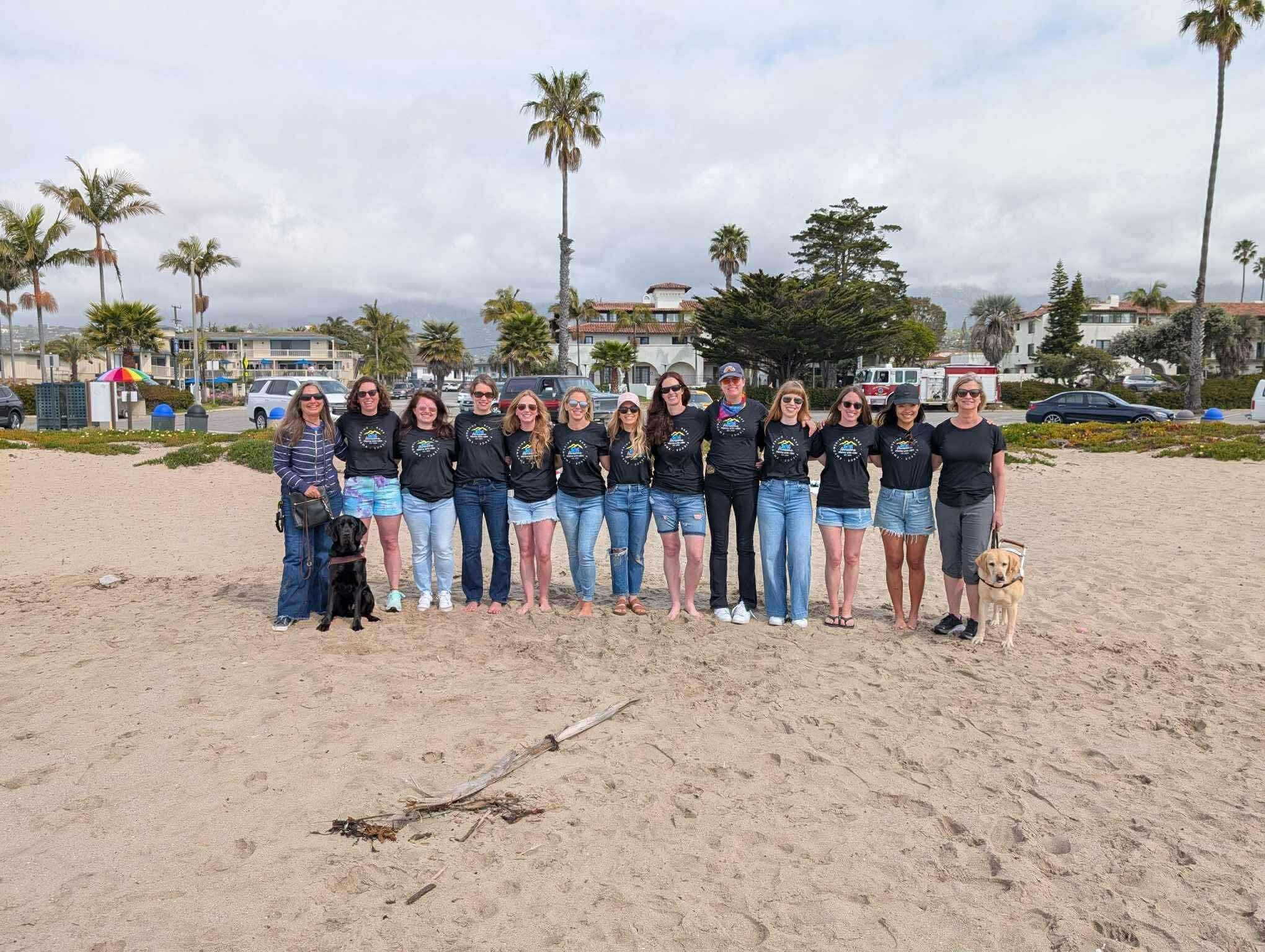
A group of thirteen women stands together on a sandy beach during the 2025 Awesome Moms with Ush Retreat in Santa Barbara. Most wear matching black retreat shirts and denim, smiling with arms around each other. A black guide dog and a yellow guide dog sit at each end of the group. Palm trees and coastal buildings line the background under a cloudy sky, capturing a moment of connection and community.
Explore more Blog posts
Moving Forward
blog Moving Forward by Americo CastilloNovember 29, 2025 Every 4 to 17 per 100,000 people—approximately 400,000 people worldwide—live with Usher syndrome. As a 17-year-old junior at Soquel High School in Capitola, California, I am one of them. Like any other student,...
Celebrating My Grandsons on Usher Syndrome Awareness Day
blog Celebrating My Grandsons on Usher Syndrome Awareness Day by Fran HickmottOctober 13, 2025 Every year when Usher Syndrome Awareness Day arrives, my mind turns to the journey of my grandsons, Ethan and Gavin. When Ethan was on the way 24 years ago, I pictured a...
Finding My Way
blog Finding My Way by Olivia CastilloSeptember 30, 2025 Who am I? I am a 19 year old girl from Capitola, California and coming this fall, I will be a junior transfer at the University of California Los Angeles majoring in Linguistics. I’ve chosen this path with the...
Help us find treatments and a cure.

